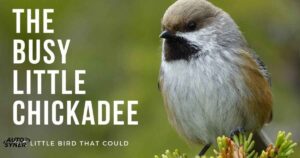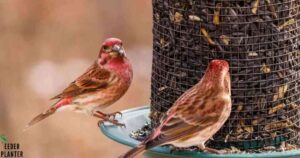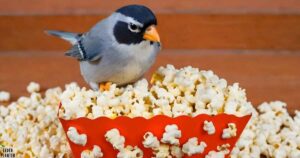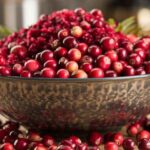Ducks are fascinating creatures with diverse dietary needs. Many duck owners and enthusiasts often wonder, “Can ducks have sunflower seeds?” This comprehensive guide will explore the world of duck diet and the role of sunflower seeds in it. We’ll delve into the nutritional benefits, potential risks, and best practices for feeding ducks sunflower seeds.
Ducks and Sunflower Seeds
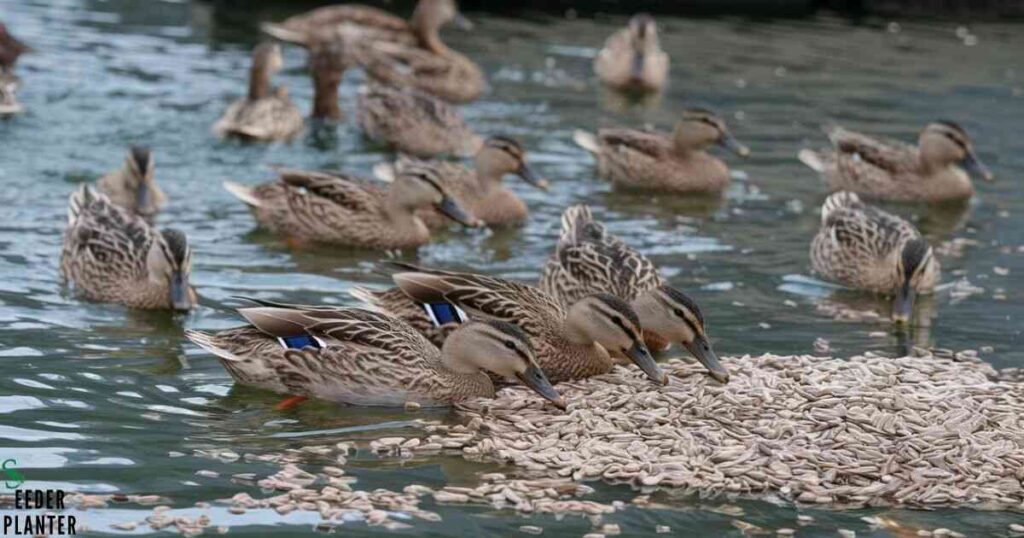
Ducks in the wild have a varied diet consisting of plants, insects, and small aquatic animals. In captivity, their diet can be supplemented with various foods, including seeds. Sunflower seeds have gained popularity as a potential food source for ducks due to their nutritional value.
The question of whether ducks can have sunflower seeds is a common one among duck keepers. These seeds are known for their high nutritional content, making them an attractive option for supplementing a duck’s diet. However, it’s crucial to understand the proper way to incorporate them into a balanced feeding regimen.
The Nutritional Value of Sunflower Seeds
Sunflower seeds are packed with essential nutrients that can benefit ducks. They are rich in vitamin E, which supports immune function and feather health. These seeds also contain vitamin B, vital for energy metabolism and overall health.
The high fat content in sunflower seeds provides a concentrated energy source for ducks. This can be particularly beneficial during colder months when ducks need extra calories to maintain body temperature. Additionally, sunflower seeds contain omega-3 fatty acids, which contribute to overall duck health.
Types of Sunflower Seeds
When considering feeding ducks sunflower seeds, it’s important to know the different types available. The two main varieties are black oil sunflower seeds and striped sunflower seeds. Each type has its own characteristics and potential benefits for ducks.
Black oil sunflower seeds for ducks are often preferred due to their thinner shells and higher oil content. These seeds are easier for ducks to crack open and digest. Striped sunflower seeds, on the other hand, have thicker shells but still offer nutritional benefits if properly prepared.
Can Ducks Eat Sunflower Seeds?
The short answer is yes, ducks can have sunflower seeds. However, there are several factors to consider when incorporating these seeds into a duck’s diet. It’s crucial to understand how to offer them safely and in appropriate quantities.
When feeding ducks sunflower seeds, moderation is key. While these seeds offer nutritional benefits, they should not make up a large portion of a duck’s diet. Sunflower seeds should be viewed as a supplement to a well-balanced diet rather than a staple food.
Benefits of Feeding Sunflower Seeds to Ducks
There are several benefits of sunflower seeds for ducks. The high vitamin E content supports immune function and may contribute to healthier feathers. The fatty acids in sunflower seeds can promote overall health and potentially improve duck egg production.
Sunflower seeds can also serve as a natural source of energy for ducks. This can be particularly beneficial during molting seasons or in colder weather when ducks require additional calories. The nutrients in sunflower seeds may also contribute to the overall vitality of ducks.
Potential Risks and Concerns
While sunflower seeds offer benefits, there are potential risks of sunflower seeds for ducks to consider. Overconsumption can lead to weight gain, which can be detrimental to a duck’s health. It’s important to offer these seeds in moderation as part of a balanced diet.
Another concern is the risk of choking, especially with larger seeds or whole seeds with shells. To mitigate this risk, consider offering shelled seeds or crushing the seeds before feeding. Always ensure that the seeds are fresh and free from mold contamination.
How to Feed Sunflower Seeds to Ducks

When it comes to feeding ducks sunflower seeds, proper preparation and presentation are crucial. Start by introducing small amounts of seeds to observe how your ducks react. Gradually increase the quantity if the ducks show interest and tolerate the seeds well.
One effective method is to mix a small amount of sunflower seeds with other duck-friendly foods. This ensures that the ducks receive a variety of nutrients and don’t fill up solely on seeds. Always provide fresh, clean water alongside any food offerings.
Raw vs. Boiled Sunflower Seeds for Ducks
The debate between raw and boiled sunflower seeds for ducks is ongoing. Raw seeds retain more of their natural nutrients but may be harder for some ducks to digest. Boiled seeds, while slightly lower in nutritional value, can be easier for ducks to consume and digest.
If you choose to boil sunflower seeds, do so without adding any salt or seasonings. Sunflower seeds without salt are the safest option for ducks. Boiling can also help soften the shells, making them easier for ducks to eat.
Shelled vs. Unshelled Sunflower Seeds
When considering how to feed ducks sunflower seeds, the choice between shelled and unshelled seeds is important. Shelled seeds, also known as sunflower hearts, are easier for ducks to eat and digest. They eliminate the risk of choking on shells.
Unshelled seeds can provide some benefits, such as natural foraging behavior and beak exercise. However, they pose a higher risk of choking and may be difficult for some ducks to crack open. If offering unshelled seeds, always supervise your ducks during feeding.
Preparing Sunflower Seeds for Ducks
Proper preparation of sunflower seeds can make them safer and more beneficial for ducks. Consider crushing or grinding the seeds to make them easier to consume. This is especially important for ducklings or older ducks with weaker beaks.
Avoid offering roasted vs unroasted sunflower seeds that have been salted or flavored. Stick to plain, unsalted seeds to ensure the safety of your ducks. Always check the seeds for any signs of spoilage or mold before feeding them to your ducks.
Sunflower Seeds as Part of a Balanced Duck Diet
While sunflower seeds can be a nutritious addition to a duck’s diet, they should not be the sole food source. A balanced diet for ducks should include a variety of foods to meet all their nutritional needs. Duck nutrition balance is crucial for their overall health and well-being.
Incorporate sunflower seeds as part of a diverse diet that includes commercial duck feed, fresh vegetables, and occasional treats. This ensures that your ducks receive a wide range of nutrients and maintain a healthy weight. Always consult with a veterinarian for personalized dietary advice.
Other Foods to Offer Alongside Sunflower Seeds
To maintain a balanced diet, offer a variety of foods alongside sunflower seeds. Fresh vegetables like lettuce, peas, and corn can provide essential vitamins and minerals. Grains such as oats and barley can be good sources of carbohydrates for energy.
Consider offering alternative seeds for ducks to provide variety. Pumpkin seeds, safflower seeds, and millet can be nutritious options. Always introduce new foods gradually and in small quantities to avoid digestive upset.
Foods to Avoid Feeding Ducks
While exploring duck treats and supplements, it’s crucial to be aware of foods that can be harmful to ducks. Avoid feeding bread, as it offers little nutritional value and can lead to malnutrition. Other foods to avoid include avocado, chocolate, and anything high in salt or sugar.
Always research any new food before offering it to your ducks. Some seemingly harmless foods can be toxic or difficult for ducks to digest. When in doubt, consult with a veterinarian or poultry nutritionist for guidance.
Feeding Wild Ducks vs. Domestic Ducks
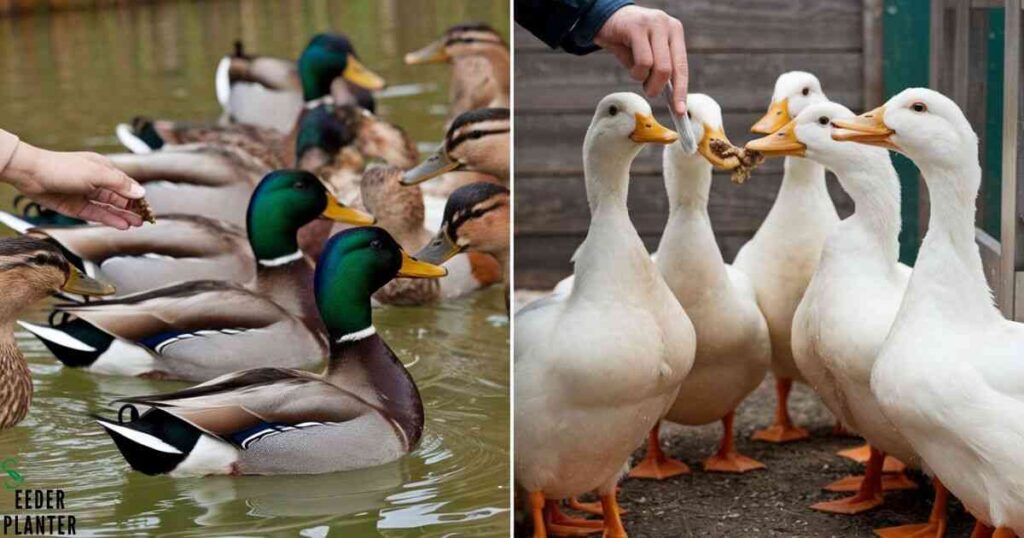
The approach to feeding wild ducks differs from that of domestic ducks. While it may be tempting to feed wild ducks sunflower seeds, it’s generally not recommended. Wild ducks have specific dietary needs met by their natural environment.
For domestic ducks, sunflower seeds and duck weight gain can be managed more easily. You can control portions and monitor your ducks’ health closely. With wild ducks, there’s a risk of creating dependency on human-provided food, which can be detrimental to their natural foraging behaviors.
Sunflower Seeds for Wild Ducks
Feeding wild ducks sunflower seeds or any human food can disrupt their natural diet and behavior. It may seem helpful, but it can lead to nutritional imbalances and overcrowding in certain areas. Instead, support wild duck populations by preserving their natural habitats.
If you encounter wild ducks, it’s best to observe them from a distance and allow them to forage naturally. This ensures they maintain their wild instincts and natural dietary habits.
Sunflower Seeds in Domestic Duck Diets
For domestic ducks, sunflower seeds can be a valuable addition to their diet when offered appropriately. They can serve as a source of healthy fats and vitamins, contributing to sunflower seeds for healthy feathers and overall vitality.
When incorporating sunflower seeds into a domestic duck’s diet, start with small amounts and observe how your ducks respond. Adjust the quantity based on their health, activity level, and overall diet composition.
Seasonal Considerations for Feeding Ducks Sunflower Seeds
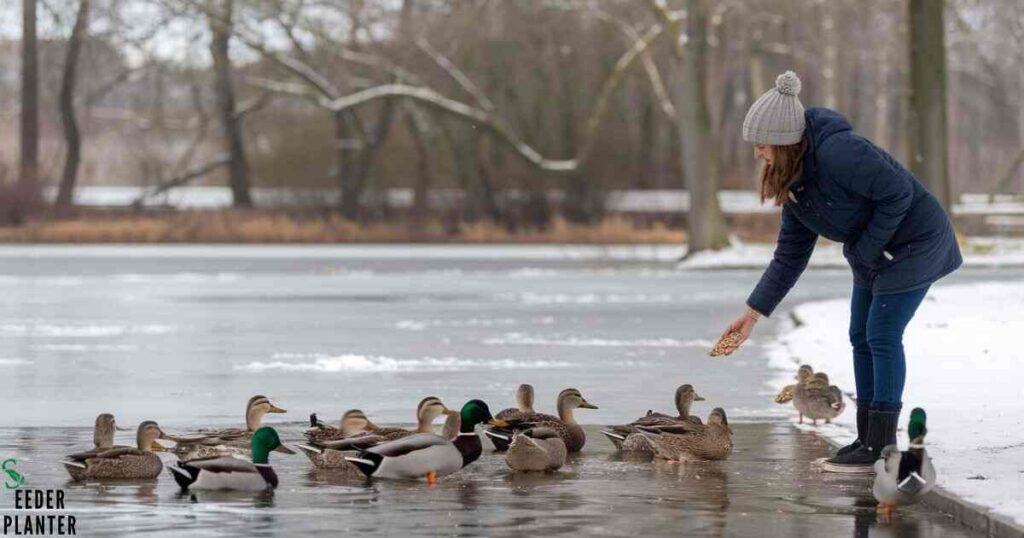
The dietary needs of ducks can vary with the seasons. During colder months, ducks may benefit from the higher fat content of sunflower seeds to help maintain body temperature. In warmer months, reduce the amount of high-fat foods to prevent excessive weight gain.
Consider offering more sunflower seeds during molting seasons when ducks need extra nutrients for feather regrowth. Always balance seasonal adjustments with the overall nutritional needs of your ducks.
Sunflower Seeds as Winter Food for Ducks
In winter, sunflower seeds can be an excellent source of energy for ducks. The high fat content helps them maintain body heat in cold weather. However, continue to offer a varied diet to ensure all nutritional needs are met.
When offering sunflower seeds in winter, ensure they are easily accessible and not buried under snow. Consider providing them in a sheltered area to protect the seeds from moisture and freezing temperatures.
Growing Sunflowers for Duck Feed
For those with space, growing sunflowers can be a sustainable way to provide seeds for your ducks. This allows you to control the quality of the seeds and ensure they are free from pesticides or other harmful substances.
When growing sunflowers for duck feed, choose varieties that produce seeds appropriate for your ducks’ size. Consider planting a mix of black oil sunflower seeds and striped varieties to offer diversity in your ducks’ diet.
Harvesting and Storing Sunflower Seeds for Ducks
Proper harvesting and storing sunflower seeds for ducks is crucial to maintain their nutritional value. Harvest sunflower heads when the back of the head turns brown and the seeds are fully developed. Allow the seeds to dry completely before storage.
Store harvested seeds in a cool, dry place to prevent mold growth. Check for spoiled sunflower seeds signs regularly, such as discoloration or unusual odors. Properly stored seeds can last for several months, providing a long-term food source for your ducks.
Read This Blog: scripture About PlantingSeeds: Cultivating Spiritual Growth?
Observing Duck Behavior When Introducing Sunflower Seeds
When introducing sunflower seeds to your ducks, observe their behavior closely. Look for signs of interest or aversion. Some ducks may take to the seeds immediately, while others may need time to adjust.
Monitor your ducks for any adverse reactions after eating sunflower seeds. Watch for changes in droppings, energy levels, or overall health. If you notice any concerning symptoms, discontinue feeding sunflower seeds and consult a veterinarian.
Adjusting Portions and Frequency
The amount of sunflower seeds to offer depends on factors like duck size, age, and overall diet. Start with small portions, such as a tablespoon per duck, and adjust based on their response and nutritional needs.
Offer sunflower seeds a few times a week rather than daily. This prevents overreliance on seeds and encourages a varied diet. Always balance seed offerings with other nutritious foods to maintain optimal duck health.
Also Read This Blog: Pansy Seeds From Plants: Unveiled Your Garden’s Hidden Treasures
Health Impacts of Sunflower Seeds on Ducks
Sunflower seeds can have positive health impacts on ducks when fed appropriately. The high vitamin E content supports immune function, while omega-3 for duck health contributes to overall well-being. These nutrients may also support duck egg production in laying hens.
However, overfeeding sunflower seeds can lead to obesity and related health issues. Monitor your ducks’ weight and adjust their diet accordingly. A balanced approach to feeding ensures that your ducks reap the benefits of sunflower seeds without negative health consequences.
Consulting with a Veterinarian
For personalized advice on incorporating sunflower seeds into your ducks’ diet, consult with a veterinarian specializing in poultry. They can provide guidance based on your specific ducks’ needs, taking into account factors like age, breed, and overall health.
A veterinarian can also help you create a comprehensive feeding plan that includes sunflower seeds as part of a balanced diet. Regular check-ups can ensure that your feeding practices are supporting optimal duck health.
Frequently Asked Question
Many duck owners have questions about incorporating sunflower seeds into their ducks’ diets. Here are some frequently asked questions to help clarify common concerns and provide additional guidance on feeding ducks sunflower seeds.
Can ducklings eat sunflower seeds?
Ducklings have different nutritional needs compared to adult ducks. While ducks can have sunflower seeds, it’s best to wait until ducklings are older before introducing them. Young ducklings require a diet high in protein for proper growth and development.
If you choose to offer sunflower seeds to older ducklings, ensure they are finely ground or crushed. This makes them easier to digest and reduces the risk of choking. Always introduce new foods gradually and in small amounts to monitor for any adverse reactions.
How often should I feed sunflower seeds to my ducks?
The frequency of feeding ducks sunflower seeds depends on various factors, including the overall diet and the ducks’ health status. As a general rule, offer sunflower seeds as a treat 2-3 times per week. This ensures that ducks benefit from the nutritional value of sunflower seeds without overreliance.
Remember that sunflower seeds should complement a balanced diet, not replace essential foods. Monitor your ducks’ weight and adjust the frequency of seed offerings accordingly. If you notice weight gain, reduce the frequency or amount of sunflower seeds provided.
Are sunflower seeds good for duck egg production?
Sunflower seeds can potentially support duck egg production due to their nutrient content. The high levels of vitamin E and healthy fats in sunflower seeds may contribute to overall reproductive health in laying ducks. However, it’s important not to rely solely on sunflower seeds for this purpose.
A balanced diet that includes a variety of nutrients is crucial for optimal egg production. While sunflower seeds can be a beneficial addition, they should be part of a comprehensive feeding plan that meets all of a laying duck’s nutritional requirements.
Can ducks digest sunflower seed shells?
While ducks can have sunflower seeds, their ability to digest the shells varies. Some ducks may be able to process small amounts of shell, but it’s generally safer to offer shelled seeds or sunflower hearts for ducks. This reduces the risk of digestive issues and potential blockages.
If you choose to offer whole sunflower seeds, monitor your ducks closely for any signs of discomfort or changes in droppings. Consider crushing the seeds or opting for varieties with thinner shells, such as black oil sunflower seeds for ducks.
What’s the best way to introduce sunflower seeds to ducks?
When introducing sunflower seeds to your ducks, start with small amounts mixed into their regular feed. This allows you to gauge their interest and monitor for any adverse reactions. Gradually increase the quantity if the ducks show a positive response.
Offer a variety of safe seeds for ducks alongside sunflower seeds to provide diverse nutrients. Always ensure that new food introductions are done slowly and in conjunction with a balanced diet. Observe your ducks’ behavior and health closely during this process.
Conclusion
In answering the question “Can ducks have sunflower seeds?”, we’ve explored the benefits, potential risks, and best practices for incorporating these nutritious seeds into a duck’s diet. When offered appropriately, sunflower seeds can be a valuable addition to your ducks’ feeding regimen.
Remember that moderation is key when feeding ducks sunflower seeds. These seeds should complement a varied diet that meets all of your ducks’ nutritional needs. By following the guidelines outlined in this article, you can safely offer sunflower seeds as a nutritious treat for your feathered friends.
Always prioritize your ducks’ overall health and well-being when making dietary decisions. Consult with a veterinarian or poultry nutritionist for personalized advice on incorporating sunflower seeds and other foods into your ducks’ diet. With proper care and attention to their nutritional needs, you can ensure that your ducks thrive and enjoy the benefits of a well-balanced diet that includes sunflower seeds.

I am Alexander James, a seasoned professional with 4 years of expertise, brings passion and skill to every project. Elevate your experience with my knowledge and creativity.
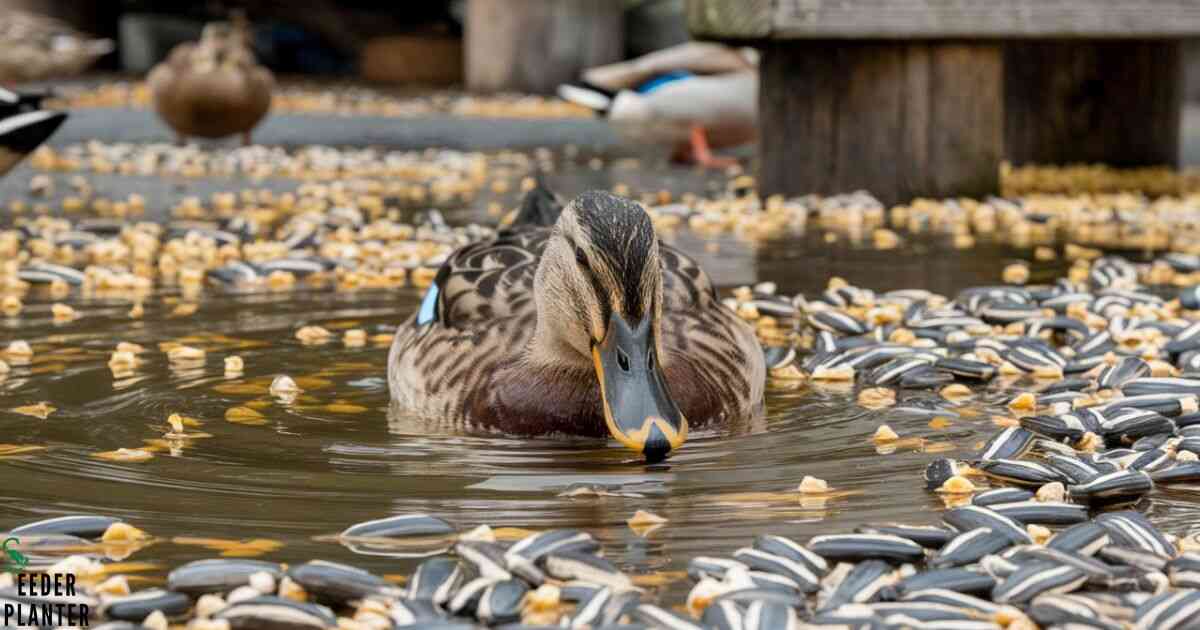

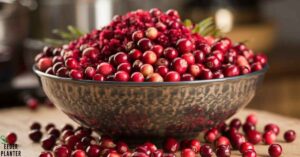
![Hollyhock Seeds: The Complete Guide to Success [2024]](https://seederabout.com/wp-content/uploads/2024/10/Hollyhock-Seeds-The-Complete-Guide-to-Success-2024-300x157.jpg)
